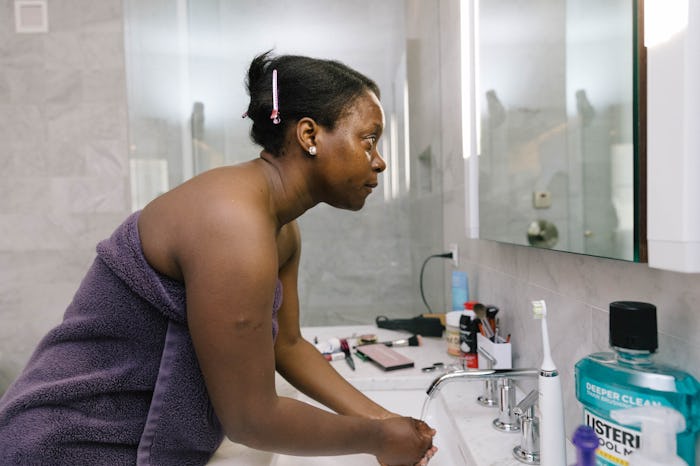Life
Here's How Ovulation Can Mess With Your Skin, According To Two Experts
If you are anything like me, you just kind of assumed acne wouldn't be an issue once you graduated high school. I mean, that's one of the benefits of adulthood, right? Clear skin? Wrong. In my 20s I got horrible acne, seemingly every month and on an almost consistent schedule. So, does ovulation make you break out, or do I just have the worst skin luck known to man?
According to the American Academy of Dermatology, hormones can play a huge role in adult acne. As a result, it's not uncommon to break out at different points during your menstrual cycle, including ovulation, the days leading up to your period, and throughout your monthly visit from Aunt Flo. To find out more about how ovulation can impact your skin, and what exactly you can do about adult acne, Romper spoke with Dr. Mary Jacobson, OB-GYN and medical director of Alpha Medical, and board-certified Dermatologist Jeffrey Fromowitz, MD FAAD of Dermatology of Boca, via email.
"If you are not in your teens, and you are experiencing monthly acne flare ups around the time of your period, you are probably experiencing hormonal acne," Fromowitz says. "For some women, hormonal fluctuations that come along with ovulation and getting their period can also cause acne flares."
And according to Jacobson, women who experience acne flares during their periods do so in a very specific way. "These women frequently develop lesions on the lower third of the face," she says. "Especially on the chin and jawline."
But how exactly do your ovaries impact your skin? Jacobson explains that the process is actually pretty complex (and a little bit gross, in my opinion). "Androgens that are secreted from the ovaries after ovulation stimulate androgen receptors found in sebaceous glands and the outer root sheath of hair follicles," she says. "Higher levels of androgens and estrogens that occur between a menstrual period and ovulation causes an accumulation of sebum and keratin in follicles, resulting in white and black heads. This reservoir of sebum and keratin also provides a growth medium for the bacteria."
The good news is that there are treatments available for acne, especially when it is related to your cycle.
Because adult acne can be triggered by things other than hormones — like stress, medications, and medical conditions — you should probably see a doctor before you attempt to treat your skin issues it at home. "If you have a perimenstrual acne flare, you should see a clinician for evaluation of hyperandrogenism, possible Polycystic Ovarian Syndrome, especially if your cycle is more than 35 days or you have male pattern hair growth," Jacobson says.
The good news is that there are treatments available for acne, especially when it is related to your cycle. "Your clinician may prescribe a topical retinoid like tretinoin or an oral retinoid like Isotretinoin, which is reserved for treating severe inflammatory acne, and not for people who are pregnant or planning to be," Jacobson continues. "They may also prescribe a topical or oral antibiotic to treat the bacteria, which can be used with over-the-counter benzoyl peroxide."
Because this type of adult acne is hormone-related, Fromowitz frequently prescribes birth control to treat it. "Certain oral contraceptives like YAZ, which is approved by the FDA for the treatment of hormonal acne, can help stabilize your hormones," he tells Romper. He also recommends another prescription medication called spironolactone, which, while not approved by the FDA to treat acne, can block the androgen receptors that cause sebum build-up.
If you find yourself suffering from adult acne, and usually when you're also enduring other monthly cycle symptoms, you aren't alone and you don't have to put up with it. The American Academy of Dermatology recommends a consultation with a board-certified dermatologist to come up with a treatment plan. Or, if you are uninsured or don't want to pay a huge co-pay, as Jacobson notes, online medical consultations are available to assist you in receiving medical help and prescriptions for treatments... and from the comfort of your couch.
This article was originally published on
